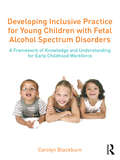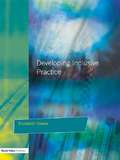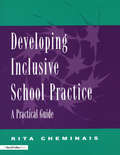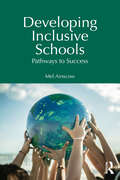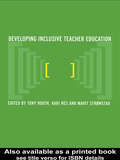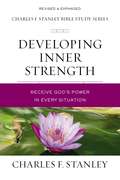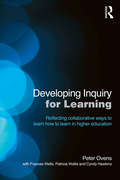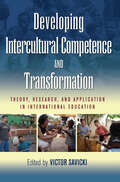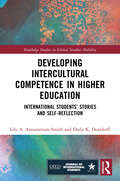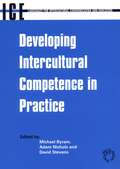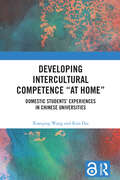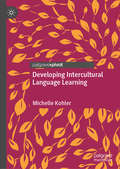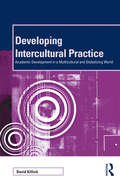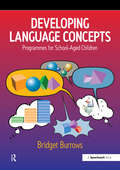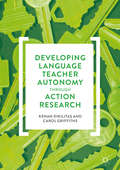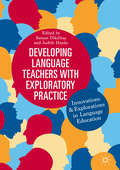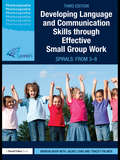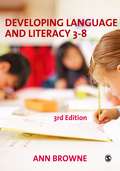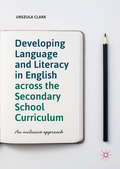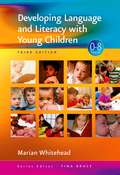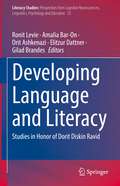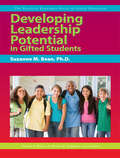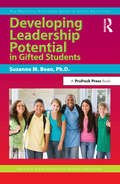- Table View
- List View
Developing Inclusive Practice for Young Children with Fetal Alcohol Spectrum Disorders: A Framework of Knowledge and Understanding for the Early Childhood Workforce
by Carolyn BlackburnChildren with Fetal Alcohol Spectrum Disorders (FASD) have emerged as a major phenomenon within the education and health care systems. Prenatal exposure to alcohol is known to result in a range of birth anomalies for infants and children. Children with FASD experience a range of developmental delays, which limit their participation and progress in a range of educational and social settings. Written by one of the UK’s top experts in the field, this practical and informative resource explores the complex and compounding socio-cultural, historical and political factors surrounding maternal drug and alcohol use, and the implications this has for young children’s learning and development across the childhood workforce. The book provides a framework of knowledge and understanding as a tool to develop inclusive practice. Developing Inclusive Practice for Young Children with Fetal Alcohol Spectrum Disorders is an essential read for all early childhood professionals and practitioners. It offers a range of pedagogical strategies to improve children’s long-term developmental trajectory, whilst supporting children and families in a sensitive, respectful manner.
Developing Inclusive Practice: The SENCO's Role in Managing Change
by Elizabeth CowneAimed at all those wishing to develop inclusive practice, this book introduces a theoretical framework for managing an inclusive approach to developing SEN practice within primary and secondary schools, together with some early years examples. Throughout the emphasis is on how to make inclusive practice work in school settings. It includes strategies to overcome common problems; examples of successful projects; case studies illustrating points made; INSET activities for training purposes; and discussion points at the end of each chapter. SENCOs and those training SENCOs should find this book particularly helpful. Members of senior management teams and anyone interested in developing inclusive practice will find it equally relevant to their needs.
Developing Inclusive School Practice: A Practical Guide
by Rita CheminaisThis practical and comprehensive book for Inclusion Coordinators (SENCOs) covers all the essential aspects of how to manage inclusion more effectively. It informs coordinators about how to move inclusive policy and practice forward, within a range of educational settings. It views inclusion from an equal opportunities perspective, relating to all pupils, irrespective of their ability, disability, age, gender, ethnicity, language and background. The book explores appointing an inclusion coordinator, the role of the inclusion coordinator, time management for inclusion coordinators, and what an inclusion policy should contain. It covers auditing inclusive practice, reviewing and evaluating inclusion, OFSTED inspecting inclusion, and the role of the governor for inclusion. It also deals with additional target setting; using the revised P scales and the Emotional Behavioural Development (EBD) scales to track and monitor pupil progress; enhancing barrier free learning and participation opportunities; and what to include in a parents/carers guide on inclusion.
Developing Inclusive Schools: Pathways to Success
by Mel AinscowIn this groundbreaking book, one of the world’s leading authorities on ways of developing equitable education systems addresses the greatest challenge facing education systems around the world, that of developing schools that are effective in educating all children. Using evidence from research carried over the last 25 years in many countries, Mel Ainscow explains pathways to be followed in order to turn the global aspiration for inclusion and equity into policy and practices in the field.Making extensive use of examples from different parts of the world, Developing Inclusive Schools provides: Practical guidance for teachers regarding ways of making their lessons inclusive Accounts of how this thinking has been implemented in schools Advice for school leaders on how to create an inclusive culture within their organisations Examples of how inclusion and equity have influenced national policies in different contexts Explanations of the implications for policy makers, researchers and teacher educators Developing Inclusive Schools will be of huge significance to researchers, educators and practitioners in the fields of education policy and politics, inclusion and special education around the world.
Developing Inclusive Teacher Education
by Tony Booth Kari Nes Marit StrømstadInclusion concerns the overcoming of barriers to learning and participation for all, regardless of ability or disability, and is now a central tenet of basic education policy globally. Increasingly, teachers need to be able to implement inclusion into their daily practice.This book stems from its contributors' shared attitude towards education based on the values of equity, entitlement, community, participation and diversity, and examines the ways in which teachers are prepared for inclusion in teacher education institutions as much as schools.Using examples of practice from schools and teaching institutions across the UK, Norway, New Zealand and the USA, the contributors use a valuable comparative approach to explore crucial questions, such as:* How are ideas and practices of inclusive schools reflected in the curriculum of teacher education?* What tools do teachers need to implement inclusion?* What are the policy and cultural contexts for the development of inclusion?* How are the barriers to learning and participation overcome in teacher education itself?This book provides an insightful analysis of whether inclusion is an achievable aim for the 21st century. Its international array of experienced contributors have put together a text that offers a distinct pedagogical focus, which makes it a key reference tool for academics, students and researchers everywhere.
Developing Inner Strength: Receive God's Power in Every Situation (Charles F. Stanley Bible Study Series)
by Charles F. StanleyAre you lonely or anxious? Do you feel burned-out and exhausted with life? In Developing Inner Strength, you will look first at Scripture, and then at yourself. You'll be led through a variety of emotional issues—including fear, brokenness, abuse, guilt, and frustration—and learn what the Bible has to say about gaining victory over those areas of your life. Best of all, you will learn that God's Holy Spirit is available to you—every day, in every situation—to bring you the peace and joy of God.With over 1 million copies sold, the Charles F. Stanley Bible Study Series is a unique approach to Bible study, incorporating biblical truth, personal insights, emotional responses, and a call to action.Each study draws on Dr. Stanley's many years of teaching the guiding principles found in God's Word, showing how we can apply them in practical ways to every situation we face. This edition of the series has been completely revised and updated, and includes two brand-new lessons from Dr. Stanley.Each of the twelve lessons includes:Overview: A brief look at what is covered in the lessonLife's Questions: A teaching from Dr. Stanley that unpacks the topic of the lessonLiving the Principle: Application and Bible study questions based on the key pointsReflection: Key takeaways to put into practice today and tomorrow
Developing Innovation in Online Learning: An Action Research Framework (Open and Flexible Learning Series)
by Maggie McPherson Miguel Baptista NunesAction research has become a valued research and educational development technique -an innovative approach through which a group of participants engage in self-reflection to improve practice. Developing Innovation in Online Learning introduces action research as a method of developing e-learning modules and courses.The book covers both the theory and practice of applying action research principles to develop online learning. The material is grounded in the experiences of practitioners and features practical advice, case studies, models for implementation, a design framework and e-tutoring strategies.The four 'building blocks' of e-learning covered are:* The organisational context* The pedagogic model* The educational setting* The evaluation processThis book will be an essential resource for education managers, course developers, and educational researchers.
Developing Inquiry for Learning: Reflecting Collaborative Ways to Learn How to Learn in Higher Education
by Peter Ovens Cyndy Hawkins Frances Wells Patricia WallisDeveloping Inquiry for Learning shows how university tutors can help students to improve their abilities to learn and to become professional inquirers. An increasing proportion of students entering higher education seem to assume that learning is a relatively passive process. This may be the largest single limitation on their achievement. University tutors need to be able to respond creatively to students’ learning needs and difficulties. The modern teaching environment in higher education demands a sophisticated approach to teaching, learning and assessment i.e. the curriculum: its planning, its development and tutors’ professional development. Tutors need fresh ideas about how to challenge students’ spoon-fed approach, to enable them to become collaborative, yet independently motivated learners. In the innovative and practically proven approach developed by the authors of this book, students are guided to implement action research into their learning practices and reflections. Using a rolling programme of cyclical inquiries and whole group ‘conferences’ on improving learning, students write ‘patches’ on learning development which are then shared across the year group online. Each student’s cumulative set of patches, together with their regular reflective writing, provide the basis for assembling a composite final assignment, a ‘Patchwork Text’, for assessment. This style of curriculum and assessment organisation encourages regular peer feedback and formative assessment, as part of the whole module process. This is a dynamic approach which builds personal confidence within students, both as learners and as professionals. Providing teaching materials and examples of students’ responses, including the use of blogs, wikis and discussion boards, Developing Inquiry for Learning analyses and theorises on the deeper characteristics of the difficulties being addressed. With the provision of relevant frameworks of theory and values, readers are amply equipped to adopt, adapt and experiment within their own developments of teaching and curricula. Tutors, particularly programme leaders, and those who are responsible for the quality of student learning across programmes, are challenged in various ways to re-evaluate current provision and are helped to improve it in ways which can be matched to local situations and priorities. Peter Ovens was Principal Lecturer in Professional and Curriculum Development at Nottingham Trent University and is now a Senior Research Fellow at the University of Cumbria. Frances Wells is a Principal Lecturer in Education at Nottingham Trent University Pat Wallis is a Senior lecturer in Professional Studies at Nottingham Trent University. Cyndy Hawkins is a Senior Lecturer in the School of Education at Nottingham Trent University
Developing Intercultural Competence and Transformation: Theory, Research, and Application in International Education
by Victor SavickiEnrollments in international education programs are projected to grow exponentially as students, parents, and university personnel seek to prepare future leaders who can live and work effectively in a global environment. What do we know about the outcomes of such programs, and how can educators become more intentional about designing, and assessing, the impact of such courses? How can we help students achieve the intercultural growth and transformation that they may envision as they set forth on their international sojourn?International education provides opportunities for students to grow personally, and to learn in a rich and intense educational environment. The outcomes of such opportunities emphasize not only traditional academic competence, but also changes in motivations, attitudes, self-identity, and values. It is these latter, co-academic, concepts that are the focus of this book. Its goal is to give solid substance to the growth and transformation approach to study abroad. It defines the central concept of intercultural competence, sets it within the framework of transformative learning theory, and offers ideas and strategies for facilitating its development. In doing so, it goes far beyond traditional emphases on the achievement of such formal skills as foreign language acquisition or specific knowledge of course content in national literatures, arts, or history.This book provides study abroad educators with a theoretical framework and examples of practice to craft more meaningful activities that will make a long-term difference in the quality of student experiences, and set the stage for transformative change. If we plan to send a million students a year to study abroad within the decade, we need approaches to maximize student growth outcomes in an efficient and effective way. It is also relevant for anyone engaged in courses in adult education, college student services, comparative and international education, international business, intercultural relations, and service learning that involve study abroad, and that raise corresponding issues of curriculum design.
Developing Intercultural Competence in Higher Education: International Students’ Stories and Self-Reflection (Routledge Studies in Global Student Mobility)
by Darla K. Deardorff Lily A. Arasaratnam-SmithThis book presents students’ reflections on their intercultural student experiences, and utilizing the UNESCO Story Circle methodology, illustrates how such reflection can aid the development of intercultural competence (IC). The volume features a broad range of first-person narratives that showcase the diversity of student experience encountered whilst studying abroad in a variety of cultural and institutional settings. Engaging with issues in relation to identity negotiation, stereotypes, cultural difference, and communities of support, the text demonstrates application of the UNESCO Story Circle approach in developing IC. Further, vignettes are analyzed and guiding questions are offered to structure readers’ reflection and discussion to facilitate further honing of intercultural competencies. The volume promotes IC amongst individual educators, trainers, international students, and community members and provides guidance in addressing international students’ wellbeing more broadly. This text will benefit scholars, academics, and students in the fields of higher education, multicultural education, and intercultural communication. Those involved with international and comparative education as well as student affair practice and higher education administration will also benefit from this volume.
Developing Intercultural Competence in Practice
by Michael Byram Adam NicholsIt is now widely recognised that learning a language should not just involve linguistic competence but also intercultural competence. It is also clear that intercultural competence can be developed through related subjects such as geography, history, mother tongue teaching. This book takes this as a given and provides practical help for teachers who wish to help their learners acquire intercultural competence in the ordinary classroom. It contains descriptions of lessons and materials from a wide range of classrooms in several countries and for beginners to advanced learners.
Developing Intercultural Competence “at Home”: Domestic Students’ Experiences in Chinese Universities
by Xiaoqing Wang Kun DaiThis book presents a mixed-methods study that explores the development of intercultural competence among local Chinese students in Chinese universities, using Deardorff’s process model of intercultural competence as a theoretical framework. In the global higher education context, “internationalization at home” is significant in (re)shaping educational practices, especially under the influence of the COVID-19 pandemic. Chinese higher education is also actively engaged in domestic internationalization. Specifically, this book explores the factors that influence Chinese students’ development of intercultural competence and their understanding of it in the context of internationalization at local Chinese universities. The findings suggest that many universities in China are trying to improve domestic students’ intercultural competence through various strategies, such as foreign language learning, extracurricular intercultural communication activities, and international cooperation programs. Notably, the effects are diverse. Based on these findings, this book also discusses the potential theoretical, practical, and policy implications. This book will be an excellent resource for students and scholars in comparative and international education, student development, cultural studies, Chinese studies, and those interested in Chinese higher education.
Developing Intercultural Competence “at Home”: Domestic Students’ Experiences in Chinese Universities
by Xiaoqing Wang Kun DaiThis book presents a mixed-methods study that explores the development of intercultural competence among local Chinese students in Chinese universities, using Deardorff’s process model of intercultural competence as a theoretical framework.In the global higher education context, “internationalization at home” is significant in (re)shaping educational practices, especially under the influence of the COVID-19 pandemic. Chinese higher education is also actively engaged in domestic internationalization. Specifically, this book explores the factors that influence Chinese students’ development of intercultural competence and their understanding of it in the context of internationalization at local Chinese universities. The findings suggest that many universities in China are trying to improve domestic students’ intercultural competence through various strategies, such as foreign language learning, extracurricular intercultural communication activities, and international cooperation programs. Notably, the effects are diverse. Based on these findings, this book also discusses the potential theoretical, practical, and policy implications.This book will be an excellent resource for students and scholars in comparative and international education, student development, cultural studies, Chinese studies, and those interested in Chinese higher education.
Developing Intercultural Language Learning
by Michelle KohlerThis book presents a detailed account of a self-study in which the author considers why a developmental perspective matters in language learning within an intercultural orientation, and how teachers of languages might understand and attend to this notion in their work. The discussion is based on the author’s experience as a teacher-researcher and traces aspects of teachers’ work from planning, teaching and mediating, to assessing and judging evidence of student learning and development over time. This book is grounded in a praxis view of language teaching and learning and will be of interest to other language teachers, pre-service teachers, teacher trainers and applied linguists.
Developing Intercultural Practice: Academic Development in a Multicultural and Globalizing World (SEDA Series)
by David KillickIntercultural higher education has the potential to enable diverse students in diverse contexts to lead lives they have reason to value in a multicultural and globalizing world. The internationalization of higher education has become a significant site of change, driven by, and contributing to, globalization. So much so that global higher education has the potential to increase collaboration or conflict across the borders of human diversity. As educators seek to better understand and develop the ways in which our universities provide appropriate learning, Developing Intercultural Practice brings perspectives from international education communities together to provide clear guidance on the effective enhancement of these dimensions of academic practice. Exploring the emergence of the post-national university and situating academic development as critical practice, Developing Intercultural Practice considers how globally distributed, multicultural students and faculty, at home, overseas, and online, can develop reciprocal and collaborative learning. Chapters cover areas such as: Internationalization, intercultural, and equitable practice Academic development and internationalization Deficit modelling and the value of diversity Norms and rituals of academic cultures Modelling intercultural academic development Developing Intercultural Practice is essential reading for faculty developers, leaders in learning and teaching, and all academics concerned to ensure their practice is relevant to their students and the worlds into which they will graduate.
Developing Language Concepts: Programmes for School-Aged Children
by Bridget BurrowsThis book is a valuable resource for all speech language therapists, teachers and support assistants working with children in schools and community clinics. It provides practical, step-by-step photocopiable programmes to help with specific language concepts, such as amount, colour, size, time and shape. The programmes are intended for speech language therapists to copy and send to the school where staff can deliver the programmes, although they can be used by the therapist themselves. Clearly set out, the exercises can be personalised for each child and are graded so that the therapist can select and copy the sheets relevant to the child's needs. Each programme introduces the concept, teaches it and then checks to see if the child understands it. There is also practical advice on setting up therapy programmes in schools, such as setting up appointments, working in the school with children, staff and parents, covering letters to send with the programme, how to write programmes and many other useful tips.
Developing Language Teacher Autonomy through Action Research
by Carol Griffiths Kenan DikilitaşThis book advances the theory of action research, analyzing how it can be used to develop autonomy among language teachers. Although acknowledging that the research process is not always linear, the authors proceed according to a clear progression which teachers can adapt to their needs. They provide examples, narratives, questions and tasks, and give multiple ideas for establishing research questions, choosing appropriate methodologies, adapting to existing contexts, and collecting data. They also suggest possible instruments, and give clear instructions for carrying out the most common kinds of statistical procedures, and ideas for presenting, discussing, and writing up research findings. In spite of its practical bias, the book is theoretically and ethically rigorous, and contains an extensive glossary for quick and easy reference. It will appeal to trainee teachers, in-service teachers wanting to expand their own professional horizons or working for a higher qualification, and is an invaluable reference for teacher-educators and scholars.
Developing Language Teachers with Exploratory Practice: Innovations and Explorations in Language Education
by Judith Hanks Kenan DikilitaşThis edited collection explores the use of Exploratory Practice (EP) by language teachers in classrooms. Written by practitioners, the chapters showcase unique examples of each principle of EP, with topics ranging from mentoring practitioner researchers, to teaching and learning in EAP, and investigating curriculum development in language teaching programs. The book provides example EP studies and gives voice to practitioners’ experiences of the challenges they experienced as well as the benefits. Examples include tackling intercultural communication in linguistically and culturally diverse classrooms; pedagogy and curriculum design in language teaching; explorations of continuing professional development in language education. In doing so, it offers tools that can be transferred to other classroom contexts and used to aid teacher development. The concluding chapter highlights critical aspects of Exploratory Practice which emerge in the studies and examines how practitioners advanced their understandings. This book will appeal to those working in Applied Linguistics, TESOL research, as well as language teachers and teacher educators.
Developing Language and Communication Skills through Effective Small Group Work: SPIRALS: From 3-8
by Marion Nash Jackie Lowe Tracey PalmerFirst published in 2011. Routledge is an imprint of Taylor & Francis, an informa company.
Developing Language and Literacy 3-8 (One-off Ser.)
by Ann BrowneA new edition of this book is available `This is a handsome Second Edition of a book that has remained an invaluable and comprehensive guide for practising and trainee teachers since its publication in 1996. . . . I hope that all practitioners who love children, language and literature will add this book to their collections of well-used professional books' - Nursery World `This is a practical book and it will be very useful for teachers and Early Years practitioners seeking to review and update their practices in literacy teaching and learning. It will be especially useful to practitioners in England and Wales who have to implement The National Literacy Strategy and the Curriculum Guidance for the Foundation Stage' - Penny Munn, International Journal of Early Years Education Developing Language and Literacy 3 - 8: Second Edition is a comprehensive and practical introduction to teaching and learning English in the early years. The new edition has been fully updated to take account of the new requirements for teaching English in the early years including, the Curriculum Guidance for the Foundation Stage, English in The National Curriculum and The National Literacy Strategy. It covers all aspects of language and literacy and draws on current thinking, research and classroom expertise in order to describe practice that is rooted in research. The book includes chapters on: - Speaking and Listening - Reading - Resources for Language and Literacy - Writing - Spelling, Handwriting and Punctuation - Bilingual Learners - Language, Literacy and Gender - Children with Difficulties - Involving Parents and Carers -Assessment - Planning Further reading and sources of information, including Websites, are given so that readers can explore aspects of English in more depth. It also includes a section on the role of the English post- holder. The book covers the English elements of the Curriculum for Initial Teacher Training, particularly those relating to pedagogical knowledge and teaching and assessment methods, and so should be of particular use and interest to trainee teachers following 3 - 8, 5 - 8 or 5 -11 courses.
Developing Language and Literacy in English across the Secondary School Curriculum: An Inclusive Approach
by Urszula ClarkThis book draws on original research and a language based pedagogy approach to examine how secondary schools in the UK can devise and implement coherent language and literacy across curriculum policies and strategies, so that grammar and associated metalanguage becomes an integral part of their day to day curriculum practices. The research was undertaken in three 11 to 18 secondary schools in England, where the majority of students are categorised as having English as a second language (EAL), and where a significant minority are also socially disadvantaged in two of the three. The author argues that paying explicit attention to the linguistic structures through which subject knowledge is realised can be of benefit to all pupils in ways that are also socially just and democratic. This book provides an important bridge between academic theory and educational practice that will appeal to applied linguists and sociolinguists, as well as to teachers, teacher trainers and practitioners.
Developing Language and Literacy with Young Children (Zero to Eight)
by Marian R Whitehead`In its third edition...the author has included the latest research evidence relating to children aged from nought to eight. Her writing embraces the value of play, relationships, bilingualism and multilingualism in creating a rich language and literacy environment. Developing Language and Literacy with Young Children will appeal to a wide range of readers - practitioners, students, and their tutors, as well as parents and carers′ - Early Years Update ′Highly readable... Anybody working with babies and young children needs to have the knowledge that Whitehead clearly explains here′ - SureStart ′One of the many excellent features of this book is the way it tackles the issue of bilingualism in early childhood′ - Early Years Educator (eye) Praise for previous editions: `Marian Whitehead forces the reader to attend to the "voice of the child against the encroachment of inappropriate curriculum demands. Her total fascination for children′s language development captures the reader in an enthusiastic and informed voyage through "the most exciting and important aspect of human development - language in the early years′ - Early Years `This is an excellent read for all parents and workers with young children. The style of the book is friendly and accessible, with beautifully produced of photographs of children and indeed of their own work. Marian Whitehead is not ashamed to draw on her experiences as a grandparent, as well as highly competent theoretical researcher; she does both with competence and humour. This will prove an excellent source book for those involved in course design from childminders to university lecturers′ - Child Language Teaching and Therapy Looking at the most exciting and important aspect of human development - communication and language in the early years - this accessible book gives carers, parents, teachers and other professionals who work and play with young children a confident understanding of children′s communication and language development in the years from birth to age eight. The book examines the wide range of elements that are typical of all our communication and language activities: thinking, feeling, imagining, talking, listening, drawing, writing and reading. The author emphasizes the importance of children′s relationships and communications with the people who care about them, spend time with them and share in the excitement of their developing languages and their investigations of literacy. Taking a holistic approach, she covers: o early communication and language o the achievements of young bilinguals o the significance of stories, narrative and language play o the emergence of literacy in homes, early years settings and classrooms. ′This highly readable guide discusses how to help babies become competent communicators...Anybody working with babies and young children needs to have the knowledge that Whitehead clearly explains here′ - SureStart
Developing Language and Literacy: Studies in Honor of Dorit Diskin Ravid (Literacy Studies #23)
by Ronit Levie Amalia Bar-On Orit Ashkenazi Elitzur Dattner Gilad BrandesThis volume dedicated to Dorit Ravid, offers 29 new chapters on the multiple facets of spoken and written language learning and usage from a group of illustrious scholars and scientists, focusing on typologically different languages and anchored in a variety of communicative settings. The book encompasses five interrelated yet distinct topics. One set of studies is in the field of developmental psycholinguistics, covering the acquisition of lexical and grammatical categories from toddlerhood to adolescence. A second topic involves a section of studies on the interface of cognition and language, with chapters on processing, production, comprehension, teaching and learning language in usage and in historical perspective. A third topic involves a theoretical and applied perspectives on the acquisition and development of literacy competence, including reading, writing, spelling and text production. A fourth topic brings together an array of studies on social, environmental and clinical diversity in language, highlighting novel issues in multilingualism, immigration, language and literacy disorders. Finally, a section of the volume examines in depth questions in Modern Hebrew linguistics, as the home language and launching base of Dorit Ravid’s research work.
Developing Leadership Potential in Gifted Students
by Suzanne M. BeanAlthough the concept of leadership is often studied, researched, and discussed, the art of leadership is still misunderstood, debated, and often neglected. It is known, however, that leadership skills can be developed and more intentional endeavors must be made to cultivate bright, young leaders for the future. Developing Leadership Potential in Gifted Students offers insight into developing leadership skills in gifted students and provides definitions and theories of leadership, looks at trends and changing paradigms, and suggests screening and identification tools for leadership as well as instructional programs and materials to incorporate into the regular curriculum. This is one of the books in Prufrock Press' popular Practical Strategies Series in Gifted Education. The series offers 25 timesaving books on critical topics for educating gifted learners. Filled with practical information and advice, these books are ideal for classroom teachers, preservice teachers, and graduate students. In preparing this series, the authors have kept the busy classroom teacher in mind. The result is a timesaving introduction to the most important issues in gifted education.
Developing Leadership Potential in Gifted Students: The Practical Strategies Series in Gifted Education
by Suzanne M. Bean Kristen R. Stephens Frances KarnesAlthough the concept of leadership is often studied, researched, and discussed, the art of leadership is still misunderstood, debated, and often neglected. It is known, however, that leadership skills can be developed and more intentional endeavors must be made to cultivate bright, young leaders for the future. Developing Leadership Potential in Gifted Students offers insight into developing leadership skills in gifted students and provides definitions and theories of leadership, looks at trends and changing paradigms, and suggests screening and identification tools for leadership as well as instructional programs and materials to incorporate into the regular curriculum.This is one of the books in Prufrock Press' popular Practical Strategies Series in Gifted Education. The series offers 25 timesaving books on critical topics for educating gifted learners. Filled with practical information and advice, these books are ideal for classroom teachers, preservice teachers, and graduate students. In preparing this series, the authors have kept the busy classroom teacher in mind. The result is a timesaving introduction to the most important issues in gifted education.
